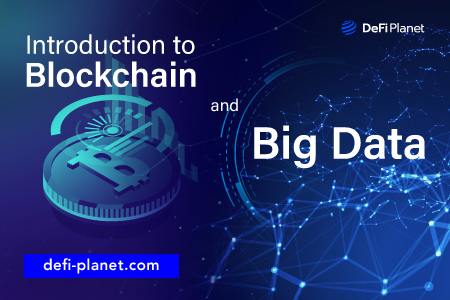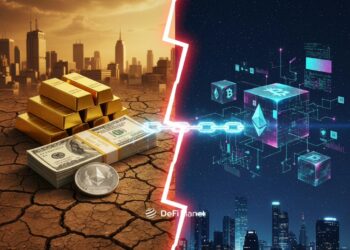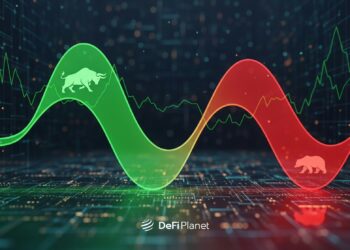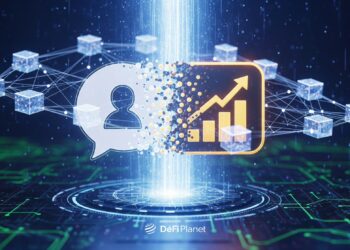Last updated on July 12th, 2023 at 12:01 am
The blockchain is a digital ledger of transactions stored, duplicated, and distributed across thousands of computers called nodes, connected to a central network. On the other hand, big data is a collection of data in large volumes that grows exponentially.
Blockchain and big data are both technologies that are closely related and work hand in hand. Many consider them as both sides of the same coin. For big data to work efficiently, there are a number of features that blockchain must bring to this technology. These include data security, data sharing management, security, and predictive analysis.
What is Blockchain?
A system that allows the storage of pieces of information without leaving room for altering these data forms the basis of blockchain. In essence, data stored on the blockchain cannot be manipulated.
The blockchain is a digital ledger of transactions stored, duplicated, and distributed across thousands of computers called nodes, connected to a central network. The blockchain is comprised of multiple blocks containing transaction information linked together by a cryptographic hash.
The blockchain, sometimes, is referred to as Distributed Ledger Technology that is managed by multiple participants.
In the past, attempts to create digital currencies ended in futility due to issues of trust. This continued until the development of Bitcoin and blockchain technology slightly over a decade ago. This explains why there is so much hype around this technology and cryptocurrencies.
Unlike the usual database like the Spreadsheets or SQL database where an administrator can manipulate entries and make changes, in the case of blockchain, data cannot be tampered with. This can only happen in the case of a 51% attack where a hacker takes control of more than half of the nodes in the network to manipulate the data.
A major difference between a typical database and a blockchain is the way the data is structured.
Blockchains collect information in groups called blocks which have specific capacities of which when filled, is chained to a previous block. This cycle is repeated and a collection of these blocks forms the blockchain.
In the case of databases, data is structured into tables.
Relationship Between Blockchain Technology and Big Data
Blockchain and big data are both considered to be powerful technologies, hence could be viewed as two sides of the same coin. While blockchain promotes data integrity by validating transactional or other forms of data, big data, otherwise known as data science, makes predictions from a large amount of data after analysis.
Similarly, just as blockchain ensures data quality, with security and immutability being in place, big data can be used to analyze transactional data stored on the blockchain.
Though blockchain and big data may work hand in hand, the former can transform the latter in a number of ways to create vast opportunities. These include:
Promoting data integrity
During the collation of large quantities of data, the possibility of having errors cannot be ruled out. However, these can be eliminated with the integration of blockchain technology. Blockchain can aid in data integrity analysis because the origin of data can be found at the beginning of blocks in the chain.
The distribution of data across several nodes in the network allows for transparency and quality. This is also due to the strict verification that takes place before new blocks are added to the blockchain.
Because blockchain is designed to operate in a decentralized manner, there is room for trust. In the case of big data, a sole administrator may be appointed to control the network. And what’s the probability that this ‘central authority’ won’t tamper with the data?
Therefore, a fusion of blockchain and data science will create more trust in the big data space.
Data sharing management
A database collection, the majority of the time, can only be seen by those who have access to it. However, integrating blockchain technology into big data will allow for the sharing of data across all nodes connected to the network. This will also prevent the exponential risk that comes with different data silos.
Data collected from research or other studies can be stored in the blockchain to prevent them from going missing. This limits the stress of having to conduct fresh research to replace lost data.
If blockchain is integrated into big data, outcomes of data analysis stored on the network can be monetized.
Preventing malicious attacks
Because blockchain technology is less prone to malicious attacks, integrating it with big data will reduce issues of malware and ransom. Before new blocks are added to the blockchain, transactions are usually verified using different consensus mechanisms, giving more credibility to data. Similarly, the distribution of these data allows for transparency.
As stated earlier, malicious attacks can only happen in the blockchain network if loopholes are capitalized on. Besides this, an attacker will have to spend unlimited resources to acquire more than half of the nodes in the system to launch an attack. This is a daunting adventure that has a high probability of ending in futility.
With blockchain technology, big data will be more secure.
Predictive Analysis
Just like any kind of data, those in the blockchain can be statically analyzed to offer valuable insights into future trends — predictive analysis. Blockchain-backed big data can be used to predict the outcome of events, such as real-time value, customer preference, and business-related rates.
Due to the distributive nature of the blockchain and associated computational infrastructure, companies that use big data will be able to make valuable predictions. These predictions may go far beyond customer preference and business-rated insights.
Where does the blockchain reside?
There is no definite answer to the resident place of the blockchain. Because the blockchain operates in a decentralized and distributive manner, there is no central place for its storage. This way, each node in the network has access to every information stored in the blockchain.
Brenda Rius cites an example to show that the blockchain is stored in computers owned by numerous people connected to the network.
Below is the example:
- Alice sends 1 bitcoin to Bob. She creates a transaction and sends it to every computer that she knows is running the Blockchain (they are called nodes). Alice’s bitcoin wallet has a pre-filled list of other nodes so she does not have to worry about actually knowing other users. This process is transparent to her.
- Each node that receives the transaction now knows that Alice is sending 1 bitcoin to Bob. They all send the transaction to all the other nodes they know which will, in turn, do the same until the whole network knows about the transaction.
- Some of these nodes are miners and are tasked to verify the transaction. But that is for another time.
Difference between blockchain and data warehouse
While the concept of blockchain is quite clear, a database is a collection of data stored in document formats or other forms that can be accessed by a limited number of people. Multiple copies of a database can be stored with the help of a central administrator or server.
Though both blockchains and databases primarily store data, the major differences lie in their properties.
- Decentralization: The blockchain operates in a decentralized manner, giving an unlimited number of people access to it. Databases, on the other hand, are centralized and be accessed by those the central administrator authorizes to do so.
- Data history: While the history of every data stored on the blockchain can be traced, data stored in the centralized database cannot be traced because it stores only present information.
- Confidentiality: While data stored on the blockchain can be accessed by an unlimited number of nodes, databases can only be accessed by a limited number of people. This means the centralized database has an advantage of confidentiality over the decentralized blockchain.
Can blockchain be queried like normal data?
Due to the security and decentralization associated with the blockchain, there is potential for limited count-party risks. Because every single node connected to the network has access to transactional data, any manipulation of figures can never go unnoticed.
Unlike blockchain, normal data can be manipulated in a number of ways. This could be due to errors in data collection or activities of ‘corrupt’ central administrators.
The properties of blockchain make it an excellent candidate to replace traditional database systems.
Can a database be migrated to a blockchain?
As technology rapidly evolves, so also is blockchain technology. A number of individuals, corporate, and government organizations are now adopting this technology to stay relevant.
To enjoy the benefits associated with blockchain technology, these organizations will have to move all relevant data to the blockchain. This will allow for transparency, security, optimal speed, enhanced business process, performance, cost efficiency, privacy, and regulatory compliance. To technically understand the pattern of how a database can be migrated to a blockchain, this material will be useful.
In Conclusion…
- Blockchain and big data are closely related technologies. A fusion of both technologies will allow for improved data security, efficient predictive analysis, effective data sharing management, as well as data integrity.
If you would like to read more interesting case studies like this, follow DeFi Planet on Twitter and LinkedIn.




















